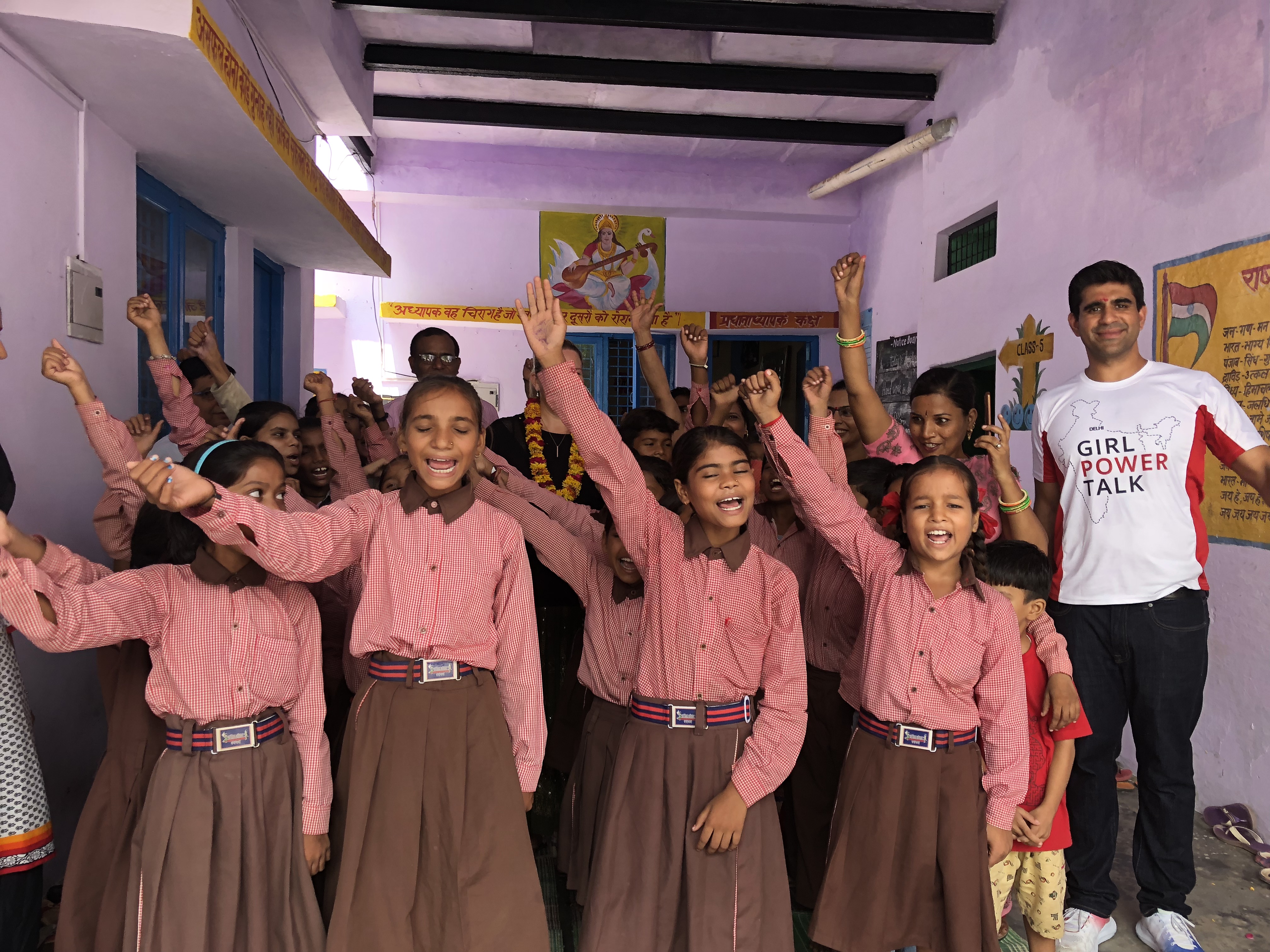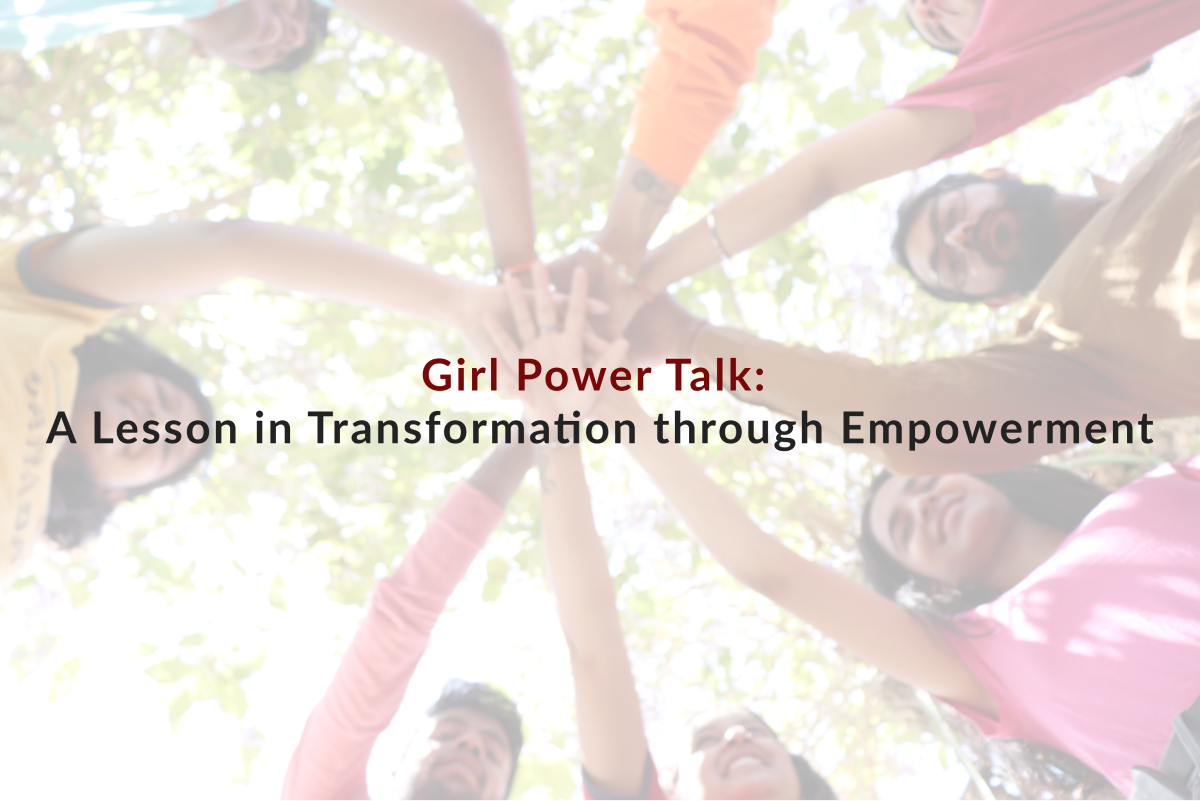As a freelance writer, I have been blessed with opportunities to work with some of the coolest companies on the planet. From my home office, I have been treated to virtual glimpses of workplaces where skateboards are a valid means of interoffice transportation, where dogs are welcomed in meeting rooms, and where hiking trails, yoga classes, and even napping spaces reflect a commitment to harmonize life with work. As the world changes its paradigms surrounding the way we do business, I have admired—and sometimes envied—the ingenuity of these companies.
No one, however, has made me more excited about the future of work than the people at Girl Power Talk. This is a company that isn’t just changing the mechanisms of the working world, it is also challenging that world’s deeply embedded assumptions and injustices. As the name might suggest, Girl Power Talk is on a mission to tackle one of the most pervasive problems on the planet: women not being afforded the same opportunities as men. At the current rate of change, achieving the gender parity they deserve will take well over a century.
Every member of the Girl Power Talk team takes on the cause of women’s empowerment every day with astounding confidence and grace. I recently sat down with them to dig a little deeper into the culture they have built and how it is having an impact on the women, men, and nonbinary people whose lives they touch.

A Global Vision with India at Its Heart
Although Girl Power Talk has initiatives in several countries on multiple continents, it is growing from its base in India, where women’s empowerment initiatives are sorely needed. According to the World Economic Forum’s latest gender gap report, India slipped 28 places in world gender equality rankings in 2021, landing at 140th out of the 156 countries surveyed.
Women are at a distinct disadvantage in India’s business world. Because India also has a disproportionately large youthful population, it is exceedingly rare for young women to find meaningful work, and it is even rarer for the companies that employ them to invest in their personal and professional development. In collaboration with its sister company, Blue Ocean Global Technology, Girl Power Talk creates change by providing merit-based opportunities for young women in a culture that rewards integrity, persistence, and achievement. But don’t suppose that there are no men at Girl Power Talk. On the contrary, co-founders Rachita Sharma and Sameer Somal knew from the outset that the brightest women want to compete with and work alongside men as equals, and that these young women would make incredible models for girls who can look up to them as they decide their own future paths.
Changing the World, One Woman at a Time
The young women at Girl Power Talk feel passionately that the organization gives them opportunities to jumpstart their careers while teaching them self-development lessons that go beyond what they gained from their formal education—which was mostly focused on rote learning. Khushboo Mishra, a senior business analyst originally from Mumbai, told me that Girl Power Talk’s mentorship model is vastly different from what is available through typical internship programs. While internships are required by Indian universities, they usually involve little actual responsibility. At Girl Power Talk, no one holds the title of an intern for more than a few months, and each individual’s ideas are valued equally regardless of their level of experience.
Paridhi Sharma, a branding analyst from the team, echoed that sentiment. “When we were asked for our opinions in school,” she said, “it was just a formality. Here at Girl Power Talk, we are molded in such a way that we have to take command and make decisions.” At first, Paridhi said, she had difficulty getting used to making presentations and leading meetings. However, as overwhelming as it was to start taking on higher-level responsibilities and contributing her unique ideas, it has grown her confidence and leadership abilities in ways she would never have believed possible. No one had ever painted that picture of her life before.

A Culture of Equal Voices, Sharp Minds, and Happy Hearts
Everyone I spoke to agreed that one of Girl Power Talk’s greatest strengths is how it cultivates an environment in which every person is encouraged to speak up and everyone’s input is valued. The young women leaders universally agree that this push to hone their communication skills while exercising their intellectual freedom has endowed them with leadership abilities that they are excited to pass on to other girls and women. Yogita Patil, the team’s senior digital marketing analyst, pointed out that learning to make a good impression with confidence is something girls are rarely taught. She remembers her first day as an intern with another company, a start-up, as a bewildering, thrown-to-the-wolves experience where she was unceremoniously assigned a desk and given a list of tasks to complete. By contrast, her first day at Girl Power Talk was solely dedicated to connecting with each team member on a personal level. Yogita believes that this approach inspires new team members to give 100% of their energy to the company.
Tina Chawla, a senior business analyst who has worked at Girl Power Talk for three years, described the atmosphere as a “dream culture.” She has always had a love of learning, and the fact that she didn’t know exactly what she wanted to do in her career when she arrived was embraced as an opportunity instead of a drawback. Rather than being pigeonholed, she was allowed to explore and grow through different kinds of work until she found the right fit for herself.
To Create Change, Men Must Be Women’s Allies
While you might suppose that men would shy away from joining Girl Power Talk and its mission, the organization has plenty of male team members who are excited to learn from their female counterparts’ perspectives and to promote their shared cause. Simran Singh, a young and super talented content writer, noticed early in her tenure that the men at the company are very willing to learn about the challenges women frequently face and help their colleagues combat those issues. When a man was given the responsibility of organizing supplies for an International Women’s Day celebration, he remarked to Simran that the task made him realize that men shouldn’t expect women to do basic, menial tasks for them and that men in India urgently need to internalize this idea. If one accepts the notion that women and men can perform at high levels with equal skill, the logical conclusion is that both genders should be comfortable handling more routine tasks.

Paridhi has also noticed a promising trend among the company’s male employees. The men at Girl Power Talk, she said, are not only contributing to women’s empowerment every day but are also seizing opportunities to brave the boundaries they themselves face. Paridhi explained that traditionally, men are expected to project toughness in the working world and that if something is negatively affecting their performance on a given day (illness, for example), they don’t talk about it the way women do. They believe they aren’t allowed simple human frailties. In Girl Power Talk’s future-forward culture, however, men are more honest about how they feel. They are comfortable saying, “I’m not feeling my best today and I’m having a hard time doing a good job on this project.”
Taking on the Ultimate Challenge: The Tech Industry
One of the things that stands out about Girl Power Talk is its team’s technological excellence, and it is inspiring to see women succeeding there in roles that are typically male-dominated. Rachita Sharma is particularly passionate about challenging the assumption that men are better at technology than women. In India, she said, parents rarely encourage—or even allow—their daughters to pursue careers in technology. She pointed to the fact that “technology is not available to girls as an educational stream, creating an illusion that boys are better at it.” In 2018, for example, 23 Indian Institute of Technology (IITs) accepted roughly 12,071 students out of approximately one million applicants, among them 10,219 were male and only 1,852 were female students. Since such a wide gender disparity has no scientific basis, this can only be because young women are not encouraged to pursue careers in technology by their educators and families. And as Sameer observed, the young women who are encouraged to go into tech by their well-intentioned parents often subsequently find themselves in a business environment steeped in misconceptions about their abilities.

Girl Power Talk prides itself on giving women hands-on experience in technological roles while spearheading programs in communities that inspire school-age girls to start learning technology when they are young. The team posits that if girls are taught to believe that these careers are for them, it will open up new avenues for them in the future.
Advice from Young Women Leaders to their Future Daughters
When I asked the team what advice they would give to any daughters they might have one day—if they chose to have children—their eyes lit up. Even though many of them are quite young leaders, they already have a keen and compassionate eye trained on girls of future generations.

Much of their advice was about having confidence and not allowing others to place limitations on them. Tina said she would reassure her daughter, “I’m here to guide you, not to control you.” Khushboo stated that she wouldn’t limit her theoretical children’s toys to dolls for girls and mechanical toys for boys, and she would tell her daughters to speak up when they see others being treated unjustly.
Paridhi emphasized that her future daughter should understand that there will always be people who misinterpret her position in the workplace—for example, assuming that she was hired to maintain a sufficient number of women on staff rather than for her natural talent. She should carry herself confidently and find exactly what fits in her own life. Simran was hopeful that by the time she had a daughter, many of the stereotypes women face will have fallen by the wayside. But if not, her daughter should know that everything in her life should be there by her own choice.
Poignantly, Rachita noted that there is a fine line between loving our daughters and protecting them to the point that we hold them back. If she has a daughter one day, she will tell her, “Go out and be the star. Get into that spotlight. If a man tells you that you are incapable of doing something, it might just be because he is intimidated by you.”

More Women Leaders Today Will Create a Better Future Tomorrow
One thing that the people at Girl Power Talk all agree on is that the majority of women in leadership positions today likely attained those roles because they were encouraged to do so. Someone along the line took the time to instill in them the notion that their success was possible and unlimited. And if more women model leadership for girls of the next generation, this will trigger a domino effect. “A woman is not just representing herself in the workplace or in leadership,” said Rachita. “She is representing hundreds and thousands and millions of other women whose life trajectory will be defined by the decisions we make.” The ultimate goal of these women leaders is to have young girls look at them and think, “If she is there, then I can be, too.”
About the Author
Catherine Traffis is a Colorado-based writer who collaborates with businesses all over the globe, from fledgling startups to the Fortune 500. She has ghostwritten several books in the business and self-help genres and is an expert contributor to the Grammarly blog. She believes that our words can change the world if we use them to inspire and empower others.


